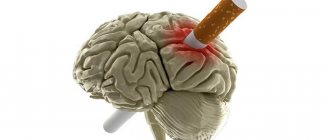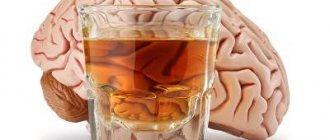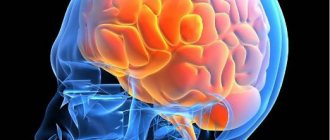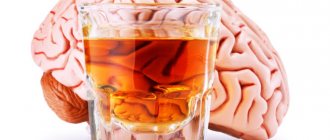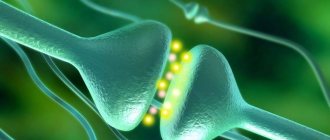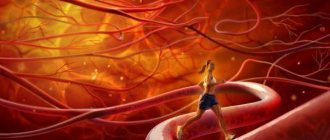One of the most complex structures in the human body is the central nervous system. The central nervous system is responsible for the uninterrupted and correct functioning of all organs. Its main task is to receive and process external signals and messages inside the body. Thanks to this structure, a person can breathe, move, speak, drink and eat. The central nervous system controls body temperature and heart rate. It has long been known that nicotine is one of the most powerful neurotoxins. Therefore, regular use of tobacco products negatively affects the human nervous system and leads to malfunctions in its functioning. A smoker may develop neurosis and many other pathologies. Let us consider in detail the effects of tobacco on the central nervous system and ways to restore it after quitting smoking.
The effect of smoking on the nervous system
Ever since school, every person knows that a drop of nicotine can kill a horse. For humans, 0.3 grams of this substance will be enough. A cigarette, of course, does not contain such an amount of poison, and not all of the nicotine will enter the bloodstream when smoked. Some remains in the mouth and is later eliminated from the body through the respiratory tract or body fluids. The other half of the toxin disperses into the air. However, over time, the need to increase the dose of the harmful substance grows, and the person begins to consume more and more cigarettes.
Nicotine tends to accumulate. After a year or two, the harmful effect of smoking on the central nervous system increases several times. The accumulated components of the cigarette begin to actively disrupt complex electrochemical processes. Further, tobacco products lead to the death of neurons. These small particles are responsible for receiving, processing information and subsequently transmitting the signal to the brain.
When a person starts smoking, the nervous system is excited under the influence of nicotine. After a few puffs, the opposite effect occurs - depression of the central nervous system occurs. This happens because the toxic substance causes vasospasm. The brain sends a signal about the need for rest, muscle weakness begins, attention becomes distracted, the head stops thinking.
Thus, smoking leads to the fact that tobacco smoke becomes the main stimulant of the nervous system and brain. This is why smokers feel that cigarettes calm them down, help them concentrate, quickly restore strength, and increase their ability to work.
The longer the smoking period, the more destructive the effect nicotine has on the nervous system. Ultimately, it all ends with the human brain refusing to function independently and requiring another portion of poison. If for some reason the smoker cannot fulfill this request, then severe anxiety and irritability arises.
Neurasthenia as a consequence of smoking
It has been noted that people suffering from nicotine addiction often suffer from neurasthenia. This is the name of a central nervous system disorder that belongs to the group of neuroses.
This problem is considered a mental illness, characterized by the following symptoms:
- excessive irritability;
- fast fatiguability;
- absent-minded attention;
- inability to engage in mental or physical activities for a long time;
- mood swings;
- frequent headaches;
- sleep problems.
How does nicotine affect a person?
Narcologists and other doctors never tire of telling how smoking affects the human nervous system. A stimulant, which contains a lot of poisonous and toxic substances, as well as narcotic components (this is not only nicotine), is capable of:
- Activate the process of blood clots.
- Stimulates the development of atherosclerosis.
- Cause nervous system disorders.
- Disrupt impulse communication between organs, tissues and the brain, which leads to various kinds of disorders.
- Cause Alzheimer's disease.
- Negatively influence the body due to its contents - formaldehydes, toxins, poisons, nicotine, etc.
- Reduce hearing and visual acuity.
- Cause cell mutation.
The harmful effect of smoking on the nervous system is that the body can no longer live even a few hours without nicotine replenishment. It is she who is able to calm the nervous system and support a person in a stressful situation.
A cigarette becomes a faithful companion during depression. Ultimately, it itself provokes an increase in the number of cigarettes smoked, which with each puff leads to the formation of pathologies, gradual organ failure and the formation of tumors.
Medicines to restore the nervous system
Medications are often required to normalize the functioning of the central nervous system. The drugs renew blood circulation and restore damaged nerve tissue.
Numerous studies have shown that antidepressants help a person quit smoking. At the same time, they will calm the nerves, relieve stress, which means that the former smoker will have a greater chance of not relapse.
To restore the central nervous system, the following is widely used in world practice:
- Bupropion . The product was invented in 1956. Then it was patented under the name Amphebutamon. The medicine slows down the action of catecholamines. These substances are responsible for the body's response to stress. The tablets have an antidepressant effect and reduce the negative effects caused by withdrawal syndrome. In addition, the drug slows down brain activity. At the same time, the medicine does not cause weight gain;
- Nortriptyline is a Czech drug that helps cope with depression that occurs as a result of quitting smoking. The medicine is used only after consultation with a doctor. The doctor prescribes the minimum dose first. The average dosage is 75-100 milligrams per day, which is 3-4 doses of one tablet. The volume increases as necessary, but it should not exceed 150 milligrams per day. As the person gets better, the dose is gradually reduced.
Effect of nicotine
The physical and mental state of a person after smoking a cigarette can be different: if one person uses smoking as stimulation, then another uses it for relaxation. This is due to the fact that acetylcholine receptors are located in different parts of the brain, are divided into types and perform stimulating and inhibitory effects.
American research data says that people with smoking addiction currently account for 24%, which is half of those who have ever smoked or smoke cigarettes for a month or more.
The stress-relieving effects of nicotine are illusory: the substance stimulates the nervous system, causing it to artificially increase levels of serotonin and dopamine, creating a feeling of emotional satisfaction that leads to addiction. Subsequently, a person is forced to increase the number of cigarettes smoked per day: when the nicotine content in the body begins to fall, an urgent need for smoking arises. The longer this does not happen, the greater the stress. The state of relief after taking a drag from a cigarette is perceived as relaxation.
The development of tobacco dependence depends on:
- genetic predisposition, which determines the peculiarity of the work of enzymes responsible for processing nicotine;
- the age of a person when he starts smoking - the younger he is, the more likely he is to develop a pronounced addiction.
Smoking and mental illness
The results of clinical studies have shown that receptors sensitive to nicotine are involved in the pathogenesis of diseases of the brain and psyche. Among patients suffering from psychiatric disorders, smokers constitute the majority of the population. The risk of starting smoking increases if the disease is in an active stage. The development of dependence on nicotine increases by almost one and a half times.
The relationship between smoking addiction and mental disorders can be explained by several hypotheses.
- Nicotine cravings and psychiatric illness have common causes and a common predisposition.
- Smoking acts as a cause of affective, neurosis-like and other disorders.
- Mental illnesses contribute to the initiation of smoking and the development of nicotine addiction. So, doctors suggest that this is the effect of dopamine, the artificial increase of which leads to the relief of some manifestations of schizophrenia or clinical depression.
The question of the cause-and-effect relationship between smoking and mental disorders currently remains open and controversial.
In some media there are articles in which journalists are trying to talk about the fact that smoking can protect against schizophrenia. However, doctors say smoking may mask symptoms to some extent in people who already have the disorder.
Smoking and other brain disorders
Nicotine has a spasmodic effect on the blood vessels of the brain, which can lead to constant headaches. Long-term smoking leads to a decrease in the elasticity of the vascular walls, and this can lead to ischemia of the brain areas and stroke - lacunar or extensive. In addition, nicotine can affect the metabolism of cholesterol, the deposition of which leads to the vessels being affected by atheroxlerotic plaques.
A person who is addicted to cigarettes may experience a decrease in various brain functions . A European study of 9 thousand subjects showed that long-term smokers experience loss of cognitive abilities 5 times faster.
Quitting smoking is beneficial even for an elderly person (contrary to the belief that at that age it’s all the same): the smoker’s blood vessels can be restored to some extent, which will prevent the development of atherosclerosis or stroke.
Research results indicate that there are direct relationships with smoking and alcohol abuse. Thus, a person who smokes is at risk of alcohol dependence (the likelihood of its development is 10 times higher than for those who do not smoke cigarettes). According to statistics, up to 95% of all people who suffer from alcoholism have a nicotine addiction. Scientists attribute this to the fact that both addictions mutually enhance due to the combined action of nicotine and acetaldehyde.
So, smoking is a harmful habit that affects the functioning of the brain. The rapid development of nicotine addiction leads to damage to the central nervous system and often accompanies mental disorders. Smoking also affects memory, attention, other cognitive processes, as well as brain vessels, which suffer from spasms and cholesterol deposits.
Traditional methods of treating the nervous system
To speed up the regeneration of the central nervous system, you can use traditional medicine, such as herbal decoction. This drink not only calms a person, but also suppresses the effects of nicotine.
To prepare the product you will need:
- thyme – 4 spoons;
- motherwort – 5 spoons;
- oregano – 5 spoons.
The herbs are mixed thoroughly. Two large spoons of raw material are poured with half a liter of boiling water and left for two hours. Then the broth is filtered and consumed one tablespoon three times a day. Over time, the dosage increases. The course of treatment is 12 days. Appointments can be renewed several times a year.
How to protect your nervous system
In order to protect the nervous system from the effects of nicotine, the smoker must maintain an active lifestyle, which will not only normalize muscle tone and blood circulation, but also improve brain function. Since nicotine depresses intellectual thinking, it is recommended to stimulate the functioning of the centers of the nervous system by doing crossword puzzles, reading books and solving problems.
A balanced diet has a positive effect on brain activity. In order to stop the negative effects of nicotinic acid on the body, a smoker needs to eat properly: his daily diet should consist of foods high in vitamins, minerals and other beneficial microelements.
Other recommendations for restoring the nervous system
For the central nervous system to function properly, you need a balanced diet. It is important that a person consumes foods that contain amino acids.
The diet of a former smoker should include:
- bananas;
- milk;
- fatty fish;
- eggs;
- greenery;
- strawberries;
- tomatoes;
- nuts;
- flour products.
If a person has become nervous, then breathing exercises will help to put emotions in order. It is best to conduct classes outdoors. Exercise renews blood flow, restores nutrition to nerve tissue, thereby elevating mood and improving cognitive abilities.
Adequate sleep is of considerable importance. For normal functioning of the central nervous system, a person must sleep 8 hours. Walking, especially in the evening, reading positive books, and listening to music will also contribute to the restoration of the central nervous system.
Will the brain recover after quitting smoking?
Once a smoker gives up the habit, his body will gradually begin to recover from the damage caused. Studies show that within 3 weeks the elasticity of the blood vessels in the brain fully returns, which ensures normalization of blood circulation. Over time, the brain cells return to normal.
The key condition for recovery processes is complete cessation of smoking , ignoring other smokers and minimizing the risk of encountering cigarette smoke in the form of a “passive” smoker.
A former smoker should be examined to determine what damage has been done to the brain. The specialist will help him speed up the recovery of the body as a whole and give practical recommendations on how to do this with maximum efficiency.
Physical activity and proper nutrition are important. Increasing the amount of nutrients entering the body will give an additional incentive to all organs to begin recovery at an accelerated pace.
Renewal of cells of the nervous system with a complete cessation of smoking will occur in approximately 30-35 days . Over the designated period, the user will normalize his condition, irritability and nicotine withdrawal will go away.
Nicotine and the nervous system
Nicotine is a neurotoxic poison that disrupts the harmonious flow of electrochemical processes in the nervous system and causes the death of neurons. When tobacco addiction occurs, the body becomes accustomed to nicotine.
Smoking also has a detrimental effect on the autonomic nervous system, impairing the functioning of internal organs - the activity of the cardiovascular system is disrupted, and the functioning of the digestive organs is disrupted.
However, according to recent studies conducted in the USA, it has been proven that nicotine stimulates cognitive abilities. Also, do not confuse the harm of smoking with the effect of pure nicotine.
A person’s intellectual activity suffers from the effects of nicotine; without a cigarette, many become unable to cope with mental tasks, memory decreases, and logical thinking weakens. Acting on the central nervous system like a drug, nicotine makes a person weak-willed and completely dependent on a bad habit.
What is nicotine?
As you know, when smoking, a special substance enters the human body - nicotine. It is an alkaloid that is a potent neurotoxin. Its main property is the ability to easily penetrate almost any protective biological barrier. In addition, this chemical can dissolve in all body fluids, including blood. Consequently, it is easily transferred to any organ, and if a certain dose of this substance (about 100 mg) enters the nervous tissue, it can lead to paralysis of the entire body. The following symptoms may appear:
- breathing stops;
- heart function slows down;
- death.
Most smokers smoke more than 25 cigarettes a day. A person who smokes does not die only because nicotine enters the body gradually (over a long time), in addition, part of it is neutralized by formaldehyde, which is also contained in tobacco products.
Health implications
The first minutes after smoking a cigarette are accompanied by an increase in strength and stimulation of the body. Therefore, a person may mistakenly mistake such progress for the positive influence of alkaloids. These substances have a destructive effect not only on the nervous system, but also on the cardiovascular system, lungs and bronchi, and harm the normal functioning of metabolism. If we consider in detail the connection between nerves and smoking, the detrimental effect on the peripheral system is expressed in several factors.
- Inflammation in the spinal cord. Symptoms caused by smoking will immediately manifest themselves in neuralgic disturbances. These are numbness of the limbs, cramps, back pain.
- An experienced smoker may experience serious disruptions in the functioning of the higher nervous system. At first it is insomnia, headaches, dizziness, impaired motor skills, memory problems, and inability to concentrate. At a more serious stage, epileptic seizures occur.
- Decreased sensitivity of taste buds. Smokers with this disorder perceive only strong tastes, and therefore prefer highly seasoned, spicy and salty foods.
- Decreased vision, painful reactions to bright light.
- There are rare cases of hearing impairment due to the effect of nicotine on the auditory nerve.
Harm of smoking
Vascular changes caused by bad habit
The blood vessels of the brain suffer from the effects of nicotine. This is expressed in various disorders, in particular, increased blood clotting and its transition to a viscous state. This, in turn, affects blood pressure. Thick blood circulates poorly through the vessels and pressure rises. In addition, when exposed to nicotine, cholesterol metabolism is disrupted and, as a result, conditions are created for the appearance of cholesterol plaques on the walls of blood vessels.
Brain damage caused by long-term cigarette smoking is manifested in the following:
Why do you feel dizzy after smoking?
- decreased local cerebral blood flow;
- difficulty in venous outflow;
- narrowing of the lumen of blood vessels.
Smoking one cigarette can cause vasospasm for 20 minutes. After nicotine penetrates the bloodstream, it easily overcomes the blood-brain barrier and affects the vasomotor center. At this stage, the parasympathetic department of the autonomic system is primarily activated, which is accompanied by disturbances in heart rhythm and vasodilation, increased blood pressure and cardiac output.
Vasoconstriction leads to oxygen starvation due to a lack of blood supply to the brain tissue. The result of this pathological process is necrosis of nerve cells. This determines the relationship between the state of cerebral vessels and smoking. What can happen when a person smokes 20 cigarettes a day? Cigarettes and nicotine are regarded by scientists as vascular poison.
Constant narrowing of the blood vessels in the brain under the influence of the toxic effects of nicotine manifests itself in symptoms such as:
- frequent headache;
- noise in ears;
- dizziness;
- weakness and decreased performance;
- memory loss:
- blurred vision.
Smoking negatively affects the condition of blood vessels in the brain
CNS addiction to nicotine
In the process of smoking, an unhealthy craving for nicotine consumption arises, which manifests itself daily. Smokers experience obsessive and compulsive addiction at the same time. Psychophysical dependence appears directly from smoking and the participation of alkaloids in the metabolic processes of the body. Psychological addiction is manifested by a person’s need to smoke, when the addict thinks about a cigarette and enjoys the process of inhaling tobacco smoke. Physical dependence involves the constant presence of nicotinic acid in the blood. In both cases, the addict experiences an urgent need to smoke.
The chemical mechanism of action of the alkaloid is a broad effect on the adrenal glands and the hormone adrenaline they secrete. The release of adrenaline improves mood and gives an imaginary feeling of relaxation and tranquility. At first, the smoker achieves a state of relaxation and calm with the help of one cigarette, but soon such a dose of nicotine will not help achieve the desired effect. A person has to smoke several cigarettes in a row. There are several stages in the addiction of the central nervous system to smoking:

